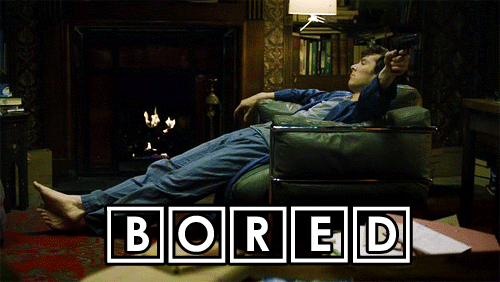Multitasking. How to deal with the ghosts of extraneous affairs
 Illustration author: John Kenn
Illustration author: John KennMultitasking makes it difficult to concentrate, complete the work that has been started, causes anxiety and fatigue, a constant sense of rush, a feeling of dissatisfaction, and work efficiency decreases.
About multitasking, and more precisely about how to deal with it, the article will be discussed.
What is multitasking?
This is the ability, or more precisely - the inability to cope with several things at the same time and focus on one thing. And while multitasking is considered an effective method of solving problems and an excellent approach to business, it is not. She will easily add a few working hours at the end of the day and stretch the achievement of the goal for months, maybe years. It would seem that if you take up two things at once, the execution time will be reduced by half, but, in fact, the time and effort will be needed twice as much, and the chances of success will be halved.
How to notice multitasking
Primary action: I deviate from the topic.
At work, we are barely able to work an hour and not check email, send SMS, call, surf the Internet, go on YouTube or Facebook, tweet something or look for a great song on Shazam.
During communication, we barely maintain an hour-long conversation with friends without using a smartphone.
We always have a lot to do, because life consists of competing requirements for attention. We juggle with tasks and make many decisions, call back, complete projects, start new ones, take someone somewhere, and take away other people from somewhere. At the same time, we housekeeping and do not lose our heads. Isn't that cool? Does this prove that we are masters of multitasking almost like Julius Caesar?

We are constantly overloaded, trying to fit as many things as possible in an hour: answering a letter, participating in a conference, checking materials for a meeting. Our diary already resembles a small novel.
And we also have unusual symptoms.
We cannot concentrate on one task for a long time, thoughts are confused, especially if the business is boring, time-consuming or lengthy. At the same time, transitions from case to case are taking more and more forces and cause depression and exhaustion. We increasingly think about the quality of work, but more and more errors appear. Carelessness is manifested and things are lost, ideas are forgotten, meetings are skipped, and replies to letters are not sent.
It has become the norm for us during a conversation not to listen to the end of the interlocutor and begin to come up with an answer or mentally criticize it. And sometimes extraneous thoughts come into my head.
Did I turn off the gas?
 You do not need to focus. * alight *
You do not need to focus. * alight *
Hidden multitasking mechanism: inability to control attention
The brain is capable of multitasking and does it perfectly. Even at this moment, while reading an article, we process what we read, we understand the meaning of what is written and create visual images, perhaps even comment on ourselves. At the same time, the heart continues to beat, and the lungs are filled with air. Our stomach does not stop functioning, and the body temperature does not go beyond the norm, we notice sounds and smells.
The brain performs millions of calculations at any given time, and although in the background it is efficient and able to work with many things at the same time, there will always be one thing in the foreground. What the brain will focus on depends on the task and needs. When reading - understanding the string of characters and the meaning of what is written. When we listen to someone - the meaning of what is said. While driving - road conditions.
Imagine yourself in a dark room with a flashlight in your hand. Our attention is a ray of light from a flashlight, we only see what falls under it. Need to look around? To do this, you need to drive the lamp from side to side, but at the same time it will be visible all the same only what is lit.
Four types of attention management are distinguished:
- Focus - a description of the current target. We see the situation and choose what to look for.
- Retention - focusing on something for a long time. Holding allows you not to be disconnected from achieving the goal and tasks for as long as necessary. At the same time, we do not miss and do not suffer from fatigue or drowsiness.
- Choosing and ignoring is the ability to concentrate on one task and not be distracted.
- Switching - actions with an abundance of stimuli requiring attention.
For a long time it was believed that there is a fifth type of effective attention management - shared attention. This is when a person can work on two or more tasks at the same time.
For example, drive a car and talk on the phone or read a book and listen to music. But later it turned out that the performance suffers.
Dividing attention into two tasks, we begin to make more mistakes and skip something in one task or both.
Shared attention is parallel multitasking.When divided, attention will be divided between different tasks, and one can get 30%, and the other 70%. It will not be possible to fully concentrate on one thing. This approach will be useful when doing a couple of things, one of which is performed on the machine. For example, when you are talking with a friend while walking in the park.
In the case when you want to pay 100% of the attention to the task, switching will be useful.
Alternating attention, it’s also switching - serial multitasking. First, we pay all attention to one task, then we switch to another and plunge into it with our heads. For example, we interrupt the conversation, check the mail, reply to messages, and then continue the conversation. It doesn't seem complicated, but it takes a lot of energy.
Side Effects of Multitasking
In most cases, multitasking is not an enviable skill, but a bad habit. It makes it difficult to concentrate and worsens concentration - it becomes difficult to understand the distribution of attention. We become distracted and worse resist distraction. Multitasking has an impact on efficiency, and there is a fine line between it and stomping on the spot.
Multitasking is the enemy of perfection.
It would not be desirable, but, being engaged in several affairs at the same time, it will not be possible to pay attention to details, and the result will suffer from this. You can become a jack of all trades, but you won’t be able to achieve heights in a specific business. Another consequence of multitasking is the loss of ability to stay focused. The ability to focus on one thing for more than five seconds is an almost lost skill.
How to overcome multitasking
We train multitasking
TED 2012, Paolo Cardini talks about multitasking. Subtitles in Russian.
Paolo Cardini, at TED 2012, offered the antidote - multitasking. We want to do something well - concentrate on the current task. The main thing is to remember the current goal . Cooking dinner? Then we restrict ourselves to slicing, boiling and frying. Do not talk on the phone, listen to TV, order a recipe book for the saga "Song of Ice and Fire." Are you driving a car? Hands on the steering wheel, feet on the pedals, and a look at the road. Do not touch the navigator, do not read SMS, do not chat with passengers.
Have a rest with friends? Then forget about important letters, calls, work and flirting with waitresses.
Of course, if necessary, it’s possible to depart from a bit of multitasking: if an excellent thought flashed, we will write it in a notebook and set aside free time. So we will not forget it, and the idea has become a side task. Side tasks are like a notebook, but not a notebook in which everything is written that distracts from the current case. The main thing is not to abuse them, otherwise it is so close to multitasking.
We train the brain
The brain is like a muscle, although not a muscle, and it needs exercises that include and strengthen the mechanisms for controlling cognitive functions and make them effective.
We notice the traps
For most people, the TOP traps are:
- TV. We will not tell you that this is just a background, and it does not interfere with doing business. Turn off the TV.
- The Internet. Now it’s more convenient to search for information than ever, but you don’t have time to look around, and already hung on YouTube to watch a video about the lemmings migration.
How to cope? We fix side tasks, open interesting links in new tabs. Useful information will not disappear, and if it turned out to be useless, we will forget about the tab and never return to it. - Food. A great example of shared attention is eating while you work.
But because of this, we eat more than necessary, and work less than planned. Plus, work begins to be associated with food, and now we can no longer work without filling our mouths.
Decision? Instead of food, we drink water. - Business meetings. Yes, those same meetings that were just an excuse to get together and chat. Solution - we plan the time at the meeting, we devote time to entertainment and chatter at the beginning and at the end, and we devote the bulk of the work.
To-do lists
The main thing is that the list of cases should be liked, otherwise we will not return to it. It does not matter where to keep a to-do list - in a notebook or in an application, the main thing is that it is a pleasure.
If you take the list of tasks, then there will be almost no items combining several tasks. The reason is simple - multitasking is intuitively perceived as meaningless. It is important to develop the habit of keeping a to-do list on hand and regularly review it, especially before starting work. The main thing is to work in order of priority tasks, and if there is any new one, we fix it for the future.
Learning to say no
 The boss gave additional work, and a friend asks for help with the project? Or maybe you need help organizing some kind of event at the child’s school?
The boss gave additional work, and a friend asks for help with the project? Or maybe you need help organizing some kind of event at the child’s school? Often we feel obligated to do something for others, although we have enough of our worries. Many people recruit a bunch of projects out of zeal, a sense of duty or a desire to be useful, although they know very well that they can’t afford it.
We are obliged to learn to say “no” and to discard all worries about other people's projects and affairs, it is still important not to reproach ourselves for the inability to help someone.
Delegate authority
The best cure for multitasking is to ask for help. This is difficult and creates stress, because entrusting the work to others, worries can be added. Although this can be frustrating, it is still worth attracting others. Seeking help can be considered mutually beneficial cooperation, but we helped others when they asked. It is time to pay the bills.
The best mutual assistance exchange is simply to hire someone.
We train the brain with boredom

Although multitasking provides incentives and energy, while multitasking brings yawning and numbness, uninteresting tasks train the brain best. Do not give up a long and tiring job - a great exercise for attention.
That's all about multitasking.
I hope that the time you spent on the article provided useful information for thought.All good, and may the Force be with you!

Read more articles on our blog: SmartTalks
A source:
